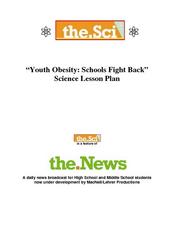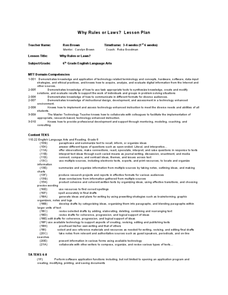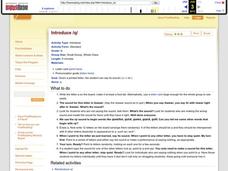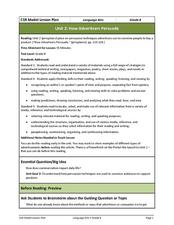Curated OER
Water - Our Future
How is it that water that falls as rain ends up coming out of the tap on our sinks? Learners trace water's journey and examine how along the way pollutants make their way into the water supply. They conduct experiments, use the Internet...
Curated OER
Youth Obesity: Schools Fight Back
Explore nutrition and healthy eating habits with a study on youth obesity. Learners watch a PBS documentary on the obesity epidemic which discusses government programs aimed at healthier choices, as well as more localized efforts. Kids...
Curated OER
Why Rules or Laws
Here’s a fresh approach to establishing classroom rules at the beginning of the school year. Class groups brainstorm what they know about rules for baseball, basketball, and football. They then consider how the games would differ without...
Curated OER
'Me Fail English? That's Unpossible' : Studying Literature with "The Simpsons"
Does your class love The Simpsons? It might seem dated, but with reruns constantly popping up on television, this show still holds the attention of most of your learners. Play the opening sequence of an episode, and brainstorm any...
Curated OER
Courage: Hero Traits
What does it mean to be a hero? Who qualifies as a hero? In groups, middle and high schoolers brainstorm a list of heroes and create a list of characteristics that a person must possess in order to be a hero. Extend this lesson plan by...
Curated OER
Exploring Careers
Now that your career explorers are thinking about the world after high school, it's time they learned how to research their options! Here's a great resource to get them gathering information from multiple sources. Learners brainstorm...
Curated OER
Introduce /Q/
Everything your pre-readers need to know about the letter Q is right here; this strategy combines pronunciation, letter recognition, sound, and word examples. Scholars examine the letter shape and listen to you pronounce the /kwww/...
Curated OER
Animals and Their Personalities
Now that your young Spanish speakers know the Spanish words for common animals, discuss what each animal eats and their personalities. It's great that the class starts by looking at an animal, identifying a characteristic or trait it...
Nevada Outdoor School
Let It Snow! Let It Melt!
Winter weather offers a great opportunity to teach young scientists about the states of matter. This activity-based lesson includes a range of learning experiences, from experimenting with the rate at which ice melts to singing a song...
Advocates for Human Rights
Civic Engagement and U.S. Immigration Policy
To conclude their study of immigration and human rights, class members create a civic engagement project centered on an issue of immigration and designed to influence US immigration policy. They examine examples of attempts to influence...
Curated OER
How Advertisers Persuade
This plan centers around the article "How Advertisers Persuade," although it is not included in the lesson itself. Get your class thinking about advertising, appeals, and techniques that companies use to get their products from the shelf...
EduGAINs
Coureurs de Bois, First Nation Peoples, and the Fur Trade
The interactions between the Coureurs de bois (runners of the woods) and the First Nation Peoples as they engaged in the fur trade are the focus on this Canadian history exercise. Kids select learning centers based on their learning...
Curated OER
Jellybeans Up Your Nose
Jellybeans Up Your Nose, by Jeff Moss, prompts a discussion of responsible and irresponsible behaviors. After reading and discussing the poem, groups of fifth graders examine a Dr. Seuss-ism, from Geisel’s Seuss-isms, and report back to...














